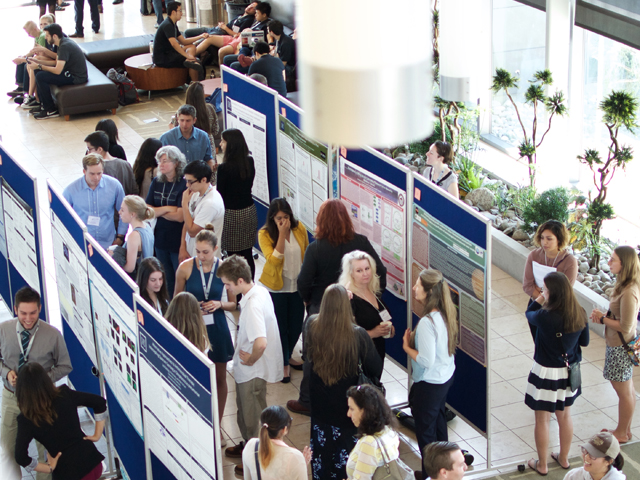Team:UCSF/Collaborations
COLLABORATIONS
In addition to working on our project, our team also assisted and collaborated with various other iGEM Teams. These interactions allowed us to form stronger connections in the iGEM community and ultimately benefited the projects of all parties involved.

Our main collaboration was with the University of Georgia iGEM Team’s Archaea Collaboration. This team’s goal is to help incorporate archaeal chassis into iGEM, so they asked several teams to help them characterize a ribosome binding site (RBS) library they had prepared. Our team was asked to compare mCherry fluorescence readings from 28 archaeal cell extract samples that they provided, each with different RBS point mutations. As each participating lab’s instrumentation is different, we had to develop our own protocols for measuring these values based on a standard set of guidelines provided by UGA. We used a fluorescence plate reader to measure the values, first setting a standard curve using their highest samples. We then had to calculate dilutions that put each of their samples in the linear detection range for this device, so we diligently ran two dilutions for each of the 28 samples. We reported our data to them, and also took a survey about our experience and an additional, more minor experiment in which they asked us to report how much dry ice was left in the package that they sent (from the above experiment). This helped them optimize their large study for amount of dry that was needed based on locations were packages were sent.
 TÜBINGEN UNIVERSITY
TÜBINGEN UNIVERSITY
We also provided the Tübingen University iGEM team with a construct previously used by the UCSF team. We sent them an E-Cadherin construct in a plasmid that targets the protein for surface display (pCTCON2). This part is a calcium dependent adhesion transmembrane protein, which plays a vital role in the formation of tissue, epithelial cell behavior, as well as the suppression of cancerous cells. We are excited to see how they used it!
 WIKI FLICKS
WIKI FLICKS
To go above and beyond in terms of our policy and practices, we have introduced our innovative program WikiFlicks (please see more on our Wiki Flicks Page).This feature acts as an extension of the annually required team Wiki pages which aims to bring science to a level in which everyone can understand. The teams involved this year were:
NORCAL iGEM MEET UP
Our team organized and gathered the local northern California iGEM teams at a Meetup from August 29-30 in Reno, NV. Teams participating were Stanford-Brown, UC Santa Cruz, Santa Clara University, SF Bay Area DIY Bio, and ourselves. We had the opportunity to present our work through talks and posters, and even had time to socialize and hang out!
This Meetup was part of a larger conference, the Sierra Systems and SynBio Symposium, which our group integrally co-organized with the University of Nevada, Reno (UNR) and Synberc (see more on our Practices Page). This two-day event gave the chance for undergraduate students from various class levels to present their findings and network with local iGEM teams. Students in lab positions (not related to iGEM) were also part of this opportunity. During this symposium, session topics ranged widely from “protein structure and degradation” and “drug interactions and genomics,” to “biosynthesis and metabolism.” We even set up a four-person graduate school panel for students to open a forum for questions and inspire the students to continue their education. Since there was ample time for us to communicate and spend time with other iGEMers, we were able to share ideas, help each other with concepts, and deepen our understanding of life around us.
SURVEYS AND DATA FORMS COMPLETED
Over the summer we provided several teams with information to help them complete their projects and human practices studies! This year we helped:
- University of Minnesota Biobricks Survey
- Michigan Software
- Nankai iShare
- Stanford-Brown on Bacterial Transformation
- Tec-Monterrey on Customs
- Vanderbilt on Mutations
- UI_Indonesia: BaContraception
- Yale on Gender and Sexuality in iGEM
 MINGDAO iGEM
MINGDAO iGEM UCSF iGEM
UCSF iGEM HIEDELBERG iGEM
HIEDELBERG iGEM TU DELFT iGEM
TU DELFT iGEM BORDEAUX iGEM
BORDEAUX iGEM HONG KONG-CUHK iGEM
HONG KONG-CUHK iGEM METU TURKEY iGEM
METU TURKEY iGEM TU DRESDEN iGEM
TU DRESDEN iGEM BGU, ISRAEL iGEM
BGU, ISRAEL iGEM VILNIUS iGEM
VILNIUS iGEM COLUMBIA iGEM
COLUMBIA iGEM ATOMS TÜRKIYE iGEM
ATOMS TÜRKIYE iGEM UCSC iGEM
UCSC iGEM BIRKBECK iGEM
BIRKBECK iGEM DUNDEE iGEM
DUNDEE iGEM IIT KHARAGPUR iGEM
IIT KHARAGPUR iGEM




















